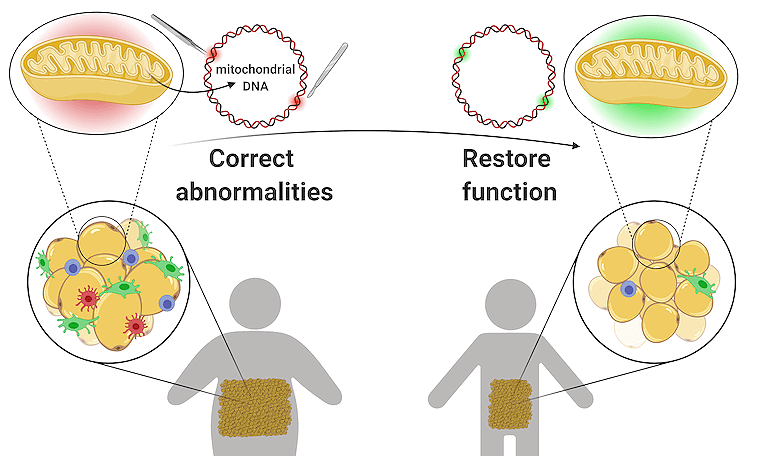2021 Bailey Award to Fund Mitochondrial DNA Research
Posted Feb 19, 2021

Posted Feb 19, 2021

Iowa State University’s 2021 Bailey Research Career Development award has been granted to a university researcher hoping to better understand and harness the power of cellular mitochondria to address a host of human health conditions.
The Bailey award — administered by the Iowa State University Office of the Vice President for Research (OVPR) — is given each year to faculty whose work is high-risk, high-reward and addresses emerging scientific, technical, or societal problems. Zengyi Shao, associate professor and Vernon Guse Faculty Fellow of Chemical and Biological Engineering, was recently selected for the annual award and will receive $150,000 in institutional funding over a period of three years. Shao’s research project, titled “Establishing a Novel Instrumental Model for Elucidating Mitochondrial DNA-Associated Dysfunction and Pathogenicity,” will both investigate the role mitochondrial dysfunction plays in a broad spectrum of health problems and pursue tailored drug development.

“By any measure, 2020 was an unprecedented year for research communities everywhere, so I am deeply grateful to be selected for this award,” Shao said. “The Bailey award represents a key milestone for my research group, aiding in a smooth transition from the biochemical engineering field to biomedical engineering. I hope to make a significant contribution to the treatment of mitochondrial diseases and highlight the critically important research taking place at Iowa State University.”
Mitochondria are most known for their job as the “powerhouses” of human cells, generating the energy needed to power biochemical reactions. Mitochondria also contain their own collection of DNA and genes separate from the nucleus, which plays a lesser known, but equally vital, role in metabolism. Within the biomedical field, it is widely accepted that mitochondrial dysfunction can play a part in many health disorders, including obesity, Type 2 diabetes, neurological disorders, cancers, and premature aging. Far less understood, though, is the complicated nature of mitochondrial genetics and the possible impact mitochondrial DNA mutations can have on these health disorders.
Shao and her research team will use Bailey funding to address this challenge by leveraging expertise in genetic tool development to concretely identify relationships between mitochondrial DNA abnormalities and diseases. Specifically, they will examine mitochondrial dysfunction in adipose (fat) tissue, evaluate mitochondrial DNA-associated human pathologies, and facilitate customized drug development for treatment of obesity and obesity-related diseases in the future.
Over the course of three years, Shao plans to create a novel, comprehensive mitochondrial genetic toolkit, with the aim of achieving the capacity of the main tool currently available for genome editing: CRISPR (Clustered Regularly Interspaced Short Palindromic Repeats) technology. Although a groundbreaking technology designed to target and alter nuclear DNA within individual cells, CRISPR has yet to translate to mitochondrial DNA editing.
Developing a successful mitochondrial genetic toolkit would not only open the door for research laboratories to perform future mitochondrial research pertaining to human health, but also lead to interdisciplinary innovations and impacts beyond Shao’s individual proposed research. If successful, the results of the project could be applied to agriculture as well, through mitochondrial manipulation strategies for producing higher-weight livestock.
Shao is quick to acknowledge the significant contributions fifth-year Chemical and Biological Engineering Ph. D. candidate Deon Ploessl has made to this effort.

“Deon and I shared an interest in broadening the mitochondrial research scope to human health,” Shao said. “We devoted the entire summer of 2020 to intensive reading and rigorous discussions, contemplating a range of ideas. Throughout the process, Deon greatly impressed me with this ability to enter a new field, identify key issues in the existing platform, and deliver high-level thinking and writing that were critical in shaping an exceptional proposal.”
Ploessl, who was previously supported by the National Science Foundation (NSF) Graduate Research Fellowships Program, will conduct the principal studies that comprise Shao’s Bailey-funded research project.
“The Bailey award represents the culmination of tremendous efforts in conceiving how to best leverage expertise in biochemical engineering to contribute to an emerging research arena,” Ploessl said. “We aspire to address the current knowledge gap in mitochondrial physiology, laying the necessary foundation for the development of potent therapeutics for mitochondrial-associated diseases.”
Moving forward, Shao and her research team will spend the first year of this project using Bailey award funding to establish a mitochondrial manipulation toolkit. The following two years will focus on deploying the toolkit to investigate the role of mitochondrial DNA in human diseases, with third year funding dependent on project results.
“Zengyi Shao’s proposed work embodies the true spirit of innovation at Iowa State and the purpose of the Bailey award – to support high-risk, high-reward research that could have a profound and far-reaching impact,” said Vice President for Research Peter Dorhout. “This work in creating a mitochondrial genetic toolkit could eventually help develop more effective therapeutic treatments and cures for some of society’s most daunting health challenges.”
The Bailey Research Career Development award, established in 2002 with a gift from Carl A. and Grace A. Bailey, is open to all Iowa State University full-time tenured associate professors and professors. More information about the application, review, and award process can be found here.